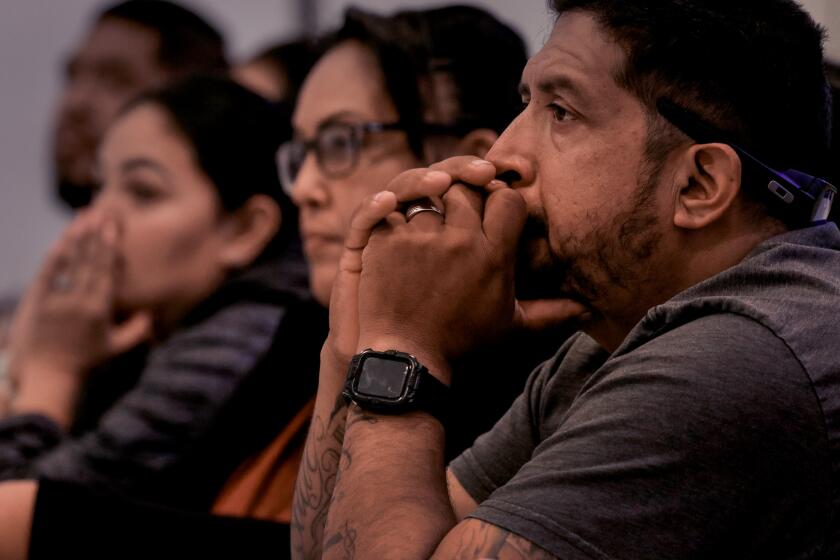Immigrant teen’s death touches off a charged debate
Reporting from Mission, Texas — The night after Thanksgiving, 18-year-old Joaquin Luna Jr. helped his diabetic mother to bed at their home among the Rio Grande Valley orange groves, and whispered beneath the decorative ceilings he had designed in drafting class that he loved her and needed her forgiveness.
As she later told another of her sons, Luna said: “I’m never going to be the person I wanted to be. I’m never going to fulfill my dreams.”
Leaving his mother to doze, Luna retreated to his room and changed into his favorite shirt and tie. Then the aspiring civil engineer locked himself in the bathroom, placed a .38 revolver under his chin and pulled the trigger.
Suicides almost always leave family and friends grasping for reasons, but Luna’s death touched off politically charged speculation well beyond this south Texas town: Did Joaquin Luna Jr. kill himself because he was an illegal immigrant?
Before Luna stepped into the bathroom, he tucked letters scrawled on notebook paper into a small Bible emblazoned with his name. Then he phoned one of his five siblings, all U.S. citizens.
“My road is finished here,” Luna told his half-brother Carlos Mendoza, 29, who lives across the street. “I’m going away.”
Mendoza said he sprinted over to his mother’s house, past the chickens in the yard. He heard a bang, and ran to the bathroom door. He broke it down.
The room smelled metallic, like firecrackers. He found his brother in the shower stall, eyes closed. He thought Luna had fainted. Then he saw blood in the young man’s ears, and called 911. When sheriff’s investigators arrived, the family gave them Luna’s Bible without looking at the letters.
Another half-brother, Diyer Mendoza, 35, said he later took a sheriff’s investigator aside to ask whether the letters mentioned Luna’s status as an illegal immigrant. The man confirmed his suspicions, Mendoza said, declining to identify the investigator because he did not want to endanger the man’s job.
Word soon spread, and Luna’s relatives and immigrant advocacy groups said his death showed why federal lawmakers must pass the DREAM Act, which would allow illegal immigrant students to attend college and put them on a path to legal residency.
Rep. Ruben Hinojosa (D-Texas), in a speech to Congress on Thursday, said Luna “took his life because he believed that he would never be able to fulfill his dream of becoming an engineer, earning his citizenship and leading a full and prosperous life in America.”
At Luna’s funeral Thursday, his family posted photos of him captioned in Spanish, “To get to heaven, you don’t need papers.”
Conservative bloggers accused immigrant groups of exploiting Luna’s death. Some cited news reports that sheriff’s investigators, who declined to be identified, said Luna did not mention his status in the letters.
“DREAM Act amnesty supporters are trying to use this young man’s suicide to rally support for their failed legislation,” Americans for Legal Immigration, a conservative group based in Raleigh, N.C., wrote on its website, calling the argument “a hoax by desperate and unscrupulous illegal immigrant invasion supporters.”
Luna’s family has come a long way since they carried him over the bridge from the industrial town of Reynosa, Mexico, as a newborn. His father left when he was small. His mother and siblings worked as migrants, and Luna traveled with them to Arkansas, Indiana and Minnesota.
They harvested asparagus, cotton, jalapenos, melons and tomatoes. In family snapshots displayed at his wake, Luna tills Arkansas fields with a miniature hoe.
Now the family lives in some of the better homes in their La Homa neighborhood, a step up from the patched trailers down their dead-end street. Luna, a lanky guitarist with an impish grin, wanted to help them rise even further.
He aced college credit classes at Benito Juarez-Abraham Lincoln High School. He had close friends but didn’t date; he told people it would be a distraction from his studies.
Luna ranked 89 in a class of 467. He scored 16 on the ACT and planned to retake the test next month.
Luna was ineligible for federal aid, but teachers reminded him that Texas considers such illegal immigrant students eligible for state aid.
After his death, his family discovered a letter saying he had recently been accepted to the University of Texas-Pan American, pending his new ACT score and transcript. Luna titled his application essay for a scholarship there “Dream.”
In excerpts displayed at his funeral, Luna wrote about the scratches he suffered picking cotton in Arkansas and why he wanted to make his family proud by going to college:
“I would demonstrate to them that all that agricultural work done and all those days of back pain would have been worth it.… Being the first one in my family with a bachelor’s degree would really complete my dream.”
Late Friday, the sheriff released Luna’s suicide notes, which Diyer Mendoza said were addressed to his mother, siblings, a few friends and Jesus Christ. Mendoza said Luna did not explicitly mention his status or the DREAM Act, but that it was implied. One note said:
Dear Lord,
Forgive me for what I am about to do tonight. I know it has to be done because I have no point of existence in this cruel world. There are many problems going among teenagers these days and I am fearful to fall in any temptation. Jesus, I have realized that I have no chance in becoming a civil engineer the way I have always dreamed of here. So I am planning on going to you and helping you construct the new temple in heaven.
Diyer Mendoza said that in recent months, Luna told him he was frustrated that even if he graduated from college, he might be unable to find work.
That frustration deepened, he said, as Luna followed news reports about the federal government cracking down on employers who hire illegal immigrants, about stricter laws in Arizona and Alabama and recent deportations in Texas.
“I know he did it because of his legal status,” Diyer Mendoza said. “I lived with him; I shared time with him. I know what I know.”
On Friday, students at Luna’s school released balloons in red and silver — the school colors — and white, each with a note inside. They sold them for $1, money that will fund a scholarship for an illegal immigrant student.
Nancy Rodriguez, 18, who went to school with Luna, wept at the sight of him in his casket, wearing the same favorite maroon shirt and striped black tie he died in.
She heard the explanations for his suicide, and none made sense to her. So she decided to buy a balloon, and to write a note: “We all miss him. There was no reason.”
And then she let go.
molly.hennessy-fiske@latimes.com
More to Read
Sign up for Essential California
The most important California stories and recommendations in your inbox every morning.
You may occasionally receive promotional content from the Los Angeles Times.











